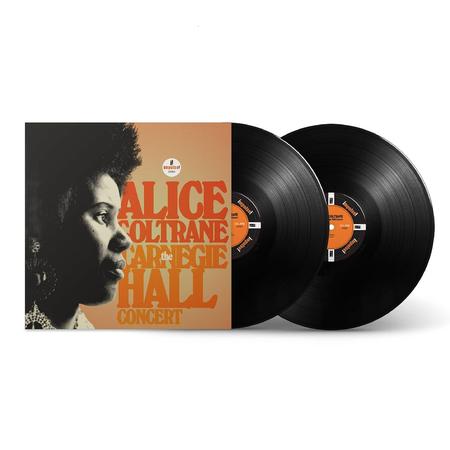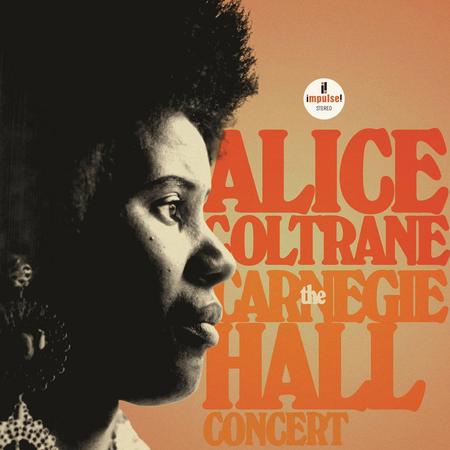1972 Alice Coltrane Concert Finally Released Fifty Two Years Later
what a story!
Why didn’t “The House That ‘Trane Built” release this Alice Coltrane record when it was originally recorded in Carnegie Hall February21st, 1971? It couldn’t have been because the musicians accompanying her weren’t worthy: Pharoah Sanders, Archie Shepp, Jimmy Garrison, Cecil McBee, Ed Blackwell, Clifford Jarvis and two lesser knowns.
It wasn’t because it was poorly recorded. The engineer was David Jones, best known for recording the two classic Bill Evans Trio’s Village Vanguard records. Jones was also Jac Holzman’s chief engineer at Elektra and recorded the legendary Connoisseur Society series. Jones recorded this to a 4 channel Ampex deck at 15 IPS.
It was Impulse’s decision to record the concert, according to Ed Michel, who was the original producer here, and co-produced with Alice Coltrane the recently reissued as part of the Verve Acoustic Sounds series, Journey in Satchidananda (Impulse AS 9203),
An interesting decision because according to Michel, the people then running the label were not all that keen on Alice Coltrane but since she controlled the John Coltrane catalog, they gave her a contract (which, a few years after this concert and a few really stellar Alice Coltrane albums, they canceled).
Sid Bernstein (of first American Beatles tour fame) produced this concert—a benefit for the Integral Yoga Institute,—with headliners Laura Nyro, The Rascals and Alice Coltrane’s double quartet. Below that in equally bold face the concert poster proclaimed “FEATURING PHAROAH SANDERS”, who at the time was becoming well known outside of the jazz world, as he again did towards the end of his life.
All were followers of Swami Satchidinanda. Alice guested on albums by The Rascals and Laura Nyro, which explains this odd concert coupling.
So why wasn’t the recording released when first produced? Even Michel can’t say for sure in his personality-saturated highly entertaining and definitely not your typical annotation, but he thinks “the suits” thought better of it and just canceled the project, which was weird because Alice Coltrane’s records during that time crossed over to the rock crowd, in part because as reported here in Lauren Du Graf’s annotation “Ed Michel, then head of A&R at Impulse Records, was aggressively peddling Alice’s music to audiences outside of jazz, through college and freeform radio.”
I bet Michel visited WBCN and planted some seeds because I was one of those “rock crowd” people who got into Alice Coltrane, though I was into John Coltrane in the ‘60s. I bought all of those Alice Coltrane albums—Ptah the El Daoud, ….Satchidananda, and Leon Thomas’s Spirits Known and Unknown.
We all loved those trippy records! Though most of us were not Swami fans and all things “Sexy Sadie”-like. Those trance inducing records were like acid trips or good during acid trips, and were, of course, very excellent free-form experimental jazz records. Alice Coltrane was very serious about her religiosity and wouldn’t like reading what I just wrote but it’s true so now I’m drifting. She was also serious about her musicianship. She plays piano, harp and percussion on this record.
So, this never got released but there was that 4 track tape, but it got lost. Fortunately, Jones had made a safety copy, but that too got lost. Fortunately, Michel had produced for himself five years after the concert and before the tapes were lost a decent rough mix from the master and that he did retain and that’s what was used here after some necessary restoration.
The sound on the vinyl record upon first play was somewhat distant but otherwise pretty good and as transparent as you’d expect from David Jones but as if you are standing at the back of the hall, though definitely in the hall because the presentation is so transparent.
This is another Kevin Reeves cut that doesn’t exhibit much visual groove action. While I know his Don Cherry and Scofield cuts were unacceptably, soft, low-in level and distant sounding and there’s no excuse for how bad those were (THEY SUCKED), here I did not have an OG because this is the OG. Fortunately there is a Qobuz 96/24 version so I played that. It’s awesome sounding. It’s what you’d expect from a David Jones recording, even if it’s a somewhat rough mix.
If in fact they did use Ed Michel's mix, why does Kevin Reeves get mixing credit on this record? Not sure what "mix" means here. Well, Reeves did a fine job mastering the files for streaming because they sound extremely good on Qobuz and that's how you should listen to them.
HOWEVER, BASED ON THIS, THE SCOFIELD, AND THE DON CHERRY RECORDS IN THIS SERIES CUT BY REEVES, KEN DRUKER WHO OVERSEES THE ACOUSTIC SOUNDS VERVE SERIES AND THE VERVE BY REQUEST SERIES MUST RELIEVE KEVIN REEVES OF HIS CUTTING JOB. THREE STRIKES AND YOU ARE OUT! DO NOT BUY THIS RECORD! OR IF YOU DO, BUY IT FOR THE GATEFOLD PRESENTATION (not "tip on" or laminated), THE FANTASTIC ANNOTATION AND THE SUPERBLY EDITED AND PRESENTED BOOKLET.
Please stream and start with “Africa”. If you must own the record, start with side 3’s “Africa” originally on John Coltrane’s Africa/Brass. The ecstasy pouring from the musicians will turn you religious. It is some of the most intense and energized blowing you’ll ever hear, especially Archie Shepp in the right channel. He positively fibrillates with ecstatic ferocity. There’s a bass solo over on the left by Cecil McBee that matches the reed intensity. It is tuneful and nimble and gets a round of applause from the audience there to see The Rascals and Nyro. There's a cowbell-like percussion instrument that's so present and forward in the mix it feels as if it's going to land in your lap. And overall it's what you'd expect from a Jones recording—at least from the streaming version.
Sid Bernstein advised Coltrane to keep the set short so she wouldn’t lose the audience. That’s hardly what happened as you’ll hear in the enthusiastic, intense sustained applause at the conclusion of “Africa”. I don’t think musicians or audiences today are capable of this level of intense performance or demonstrable gratitude.
As for the Swami, he always looked like somewhat of an opportunist underneath the hair and robes. We used to disrespectfully call him Snatchitinhanda (or more offensively Snatchinhanda) but apparently Alice Coltrane was well-served by his counsel, which seemed based on this annotation more Suze Orman practical than Joel Osteen inspirational.
The Swami, whose real name was Ramaswamy Gounder, was a businessman from a wealthy family with two children, who, following his wife’s death after five years of marriage, renounced all things secular, left his children with his mother, and eventually became the Swami.
Lauren Du Graf writes “That same year (1972), Satchidananda found himself mired in controversy for his relationships with his students; a guru who like man others, proved to be all too human.” What a surprise.
Michel at the end of his annotation writes about recording Satchindananda at The Village Recorders, for a benediction to be added to World Galaxy. Michel writes: “To no one’s surprise he was a nail-it-in-one-take guy.”
He came into the studio afterwards and said to Michel, “Before I became a Swami, I was a cinematographer, so naturally I’m curious about recording technology….”
“He showed me a picture of himself from that time”, Michel wrote, “looking very much the lounge lizard in a sharp suit and slicked-back hair.”
Not surprising but damn, he could direct these musicians towards a state of sheer, pure transcendental ecstatic bliss you’ll hear and share with them on this extraordinary recording you should stream and not buy on vinyl. And Alice Coltrane in 2003 did say, "He was a great person and a great yogi. He gave the best lectures, and he was very universally minded...I didn't seek any spiritual guidance from anyone else after him."
 "Don't Buy Me—Stream Me"
"Don't Buy Me—Stream Me"










































.png)








